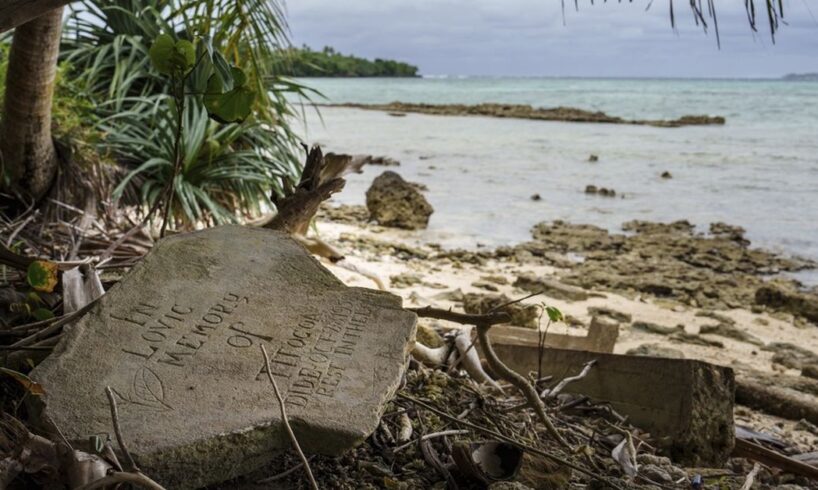
A “historic” court ruling could pave the way for reparations for nations harmed by climate change and force major fossil fuel exporters such as Australia to look hard at taking greater action.
In a landmark advisory opinion issued on Wednesday (early Thursday AEST), the United Nations’ top court said countries could be in violation of international law if they fail to take measures to protect the planet from climate change.
Advocates immediately cheered the International Court of Justice opinion on nations’ obligations to tackle climate change and the consequences they may face if they don’t, in a case brought by one of Australia’s Pacific neighbours.
A gravestone lies just metres from the shoreline on Pele Island, Vanuatu, Friday, July 18, 2025. (AP Photo/Annika Hammerschlag)
“Failure of a state to take appropriate action to protect the climate system … may constitute an internationally wrongful act,” court President Yuji Iwasawa said during the hearing.
He called the climate crisis “an existential problem of planetary proportions that imperils all forms of life and the very health of our planet.”
The non-binding opinion, backed unanimously by the court’s 15 judges, was hailed as a turning point in international climate law.
Notably, the court said a “clean, healthy and sustainable environment” is a human right.
That paves the way for other legal actions, including states returning to the ICJ to hold each other to account as well as domestic lawsuits, along with legal instruments like investment agreements.
Judges, right, arrive to the International Court of Justice for an advisory opinion on what legal obligations nations have to address climate change and what consequences they may face if they don’t, Wednesday, July 23, 2025, in The Hague, Netherlands. (AP Photo/Peter Dejong)
What it means for Australia
Australian climate change and environmental law researcher Dr Julia Dehm said she wouldn’t be surprised if the case sparked more litigation on the domestic, regional and international level.
“This is a historic ruling from the International Court of Justice, because it really powerfully sets out the legal obligations that all states have to take action to address climate change,” she told 9News.
“And the court recognised that this is an urgent and existential threat of planetary proportions that imperils all forms of life.”
The ARC DECRA fellow and Associate Professor in the School of Law at La Trobe University said while the opinion was global in scale, there were a number of key takeaways for Australia.
The parts of Australia set to have the biggest increase in scorching days
Particularly, comments from the ICJ about failures to meet obligations to fight climate change needed to be “taken very seriously by Australia”.
“The failure of a state to take appropriate action to protect the climate system from greenhouse gas emissions, including through fossil fuel production, fossil fuel consumption, the granting of fossil fuel exploration licences or the provision of fossil fuel subsidies may constitute an internationally wrongful act,” Dehm said.
“Australia is one of the largest fossil fuel exporters globally and this, I think, has really significant implications for Australia.”
The ruling could also have major implications for how hard Australia needs to go when preparing its updated emissions reduction targets, which need to be more ambitious, for the next COP global climate change conference.
While it was unlikely to have a direct impact on Australian laws instantly, the decision could be relied upon by higher courts in Australia when making decisions in areas without local precedents.
O’Connor in Western Australia is set to experience 98 sweltering days over 35 by 2090 – an increase of 28 from current levels. (iStock)
‘Today, the tables have turned’
The Pacific island of Vanuatu, about 1800 kilometres from the Queensland coast, led the case and more than 130 countries backed it.
All UN member states, including Australia and major greenhouse gas emitters like the United States and China, are parties to the court.
Climate activists had gathered outside the crowded court with a banner that read: “Courts have spoken. The law is clear. States must ACT NOW.”
They watched the ruling on a giant screen, clapping and cheering at times during the two-hour hearing. When it was over, others emerged from the courtroom laughing and hugging.
“Today, the tables have turned. The world’s highest court provided us with a powerful new tool to protect people from the devastating impacts of the climate crisis — and to deliver justice for the harm their emissions have already caused,” former UN human rights chief Mary Robinson said in a statement.
Pacific Islands Students Fighting Climate Change director Vishal Prasad said the decision brought us “closer to a world where governments can no longer turn a blind eye to their legal responsibilities”.
Activists demonstrate outside the International Court of Justice ahead of an advisory opinion on what legal obligations nations have to address climate change and what consequences they may face if they don’t, Wednesday, July 23, 2025, in The Hague, Netherlands. (AP Photo/Peter Dejong)
“It affirms a simple truth of climate justice: Those who did the least to fuel this crisis deserve protection, reparations, and a future,” he said.
After years of lobbying by vulnerable island nations who fear they could disappear under rising sea waters, the UN General Assembly asked the ICJ in 2023 for an advisory opinion, an important basis for international obligations.
Its panel was tasked with answering what are countries obliged to do under international law to protect the climate and environment from human-caused greenhouse gas emissions and what are the legal consequences for governments when their acts, or lack of action, have significantly harmed the climate and environment?
“The stakes could not be higher. The survival of my people and so many others is on the line,” Vanuatu Attorney-General Arnold Kiel Loughman told the court during a week of hearings in December.
An activist holds a fan that reads “make polluters pay” as they demonstrate outside the International Court of Justice ahead of an advisory opinion on what legal obligations nations have to address climate change and which consequences they may face if they don’t, on Wednesday, July 23, 2025, in The Hague, Netherlands. (AP Photo/Peter Dejong)
In the decade up to 2023, sea levels rose by a global average of about 4.3 centimetres, even higher in parts of the Pacific.
The world has warmed 1.3 degrees since preindustrial times because of the burning of fossil fuels, knocking on the door of limits imposed by the Paris Agreement.
Ralph Regenvanu, Vanuatu’s minister for climate change, called the ruling a “very important course correction in this critically important time”.
“For the first time in history, the ICJ has spoken directly about the biggest threat facing humanity,” he said.
He said the ruling exceeded his expectations.
“I didn’t expect it to be good. It’s good. And it did go above and beyond,” he told reporters in the Netherlands city of The Hague
Ruling could be leverage at next UN climate conference
Activists could bring lawsuits against their own countries for failing to comply with the decision, which ran to more than 130 pages.
The senior attorney at the Centre for International Environmental Law, Erika Lennon, said the ruling also can be used as leverage at the next UN climate conference later this year in the Brazilian city of Belém.
A sea turtle nibbles on what remains of the once vibrant reef at Havannah Harbour, off the coast of Efate Island, Vanuatu, on Sunday, July 20, 2025. (AP Photo/Annika Hammerschlag)”States must take this ICJ ruling and use it to advance ambitious outcomes at COP30 and beyond. People and the planet deserve it,” she said.
The United States and Russia, both of whom are major petroleum-producing states, are staunchly opposed to the court mandating emissions reductions.
But those who cling to fossil fuels could go broke doing it, the UN secretary-general told The Associated Press in an exclusive interview this week.
Simply having the court issue an opinion is the latest in a series of legal victories for the small island nations. Earlier this month, the Inter-American Court of Human Rights found that countries have a legal duty not only to avoid environmental harm but also to protect and restore ecosystems.
Last year, the European Court of Human Rights ruled that countries must better protect their people from the consequences of climate change.
In 2019, the Netherlands’ Supreme court handed down the first major legal win for climate activists when judges ruled that protection from the potentially devastating effects of climate change was a human right and that the government has a duty to protect its citizens.
– Reported with Associated Press





